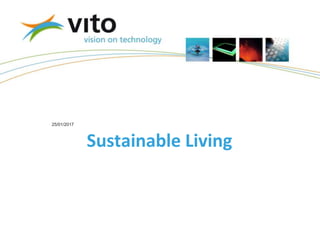More Related Content
Similar to EcologicalEconomics
Similar to EcologicalEconomics (20)
More from Dr, Madhava Madireddy
More from Dr, Madhava Madireddy (20)
EcologicalEconomics
- 3. 25/01/2017 3
© 2010, VITO NV
In the first chapter, "The Problem of Production", Schumacher argues that the
modern economy is unsustainable. Natural resources (like fossil fuels), are
treated as expendable income, when in fact they should be treated as capital,
since they are not renewable, and thus subject to eventual depletion. He
further argues that nature's resistance to pollution is limited as well. He
concludes that government effort must be concentrated on sustainable
development, because relatively minor improvements, for example, technology
transfer to Third World countries, will not solve the underlying problem of an
unsustainable economy.
Schumacher's philosophy is one of "enoughness," appreciating both human
needs, limitations and appropriate use of technology. It grew out of his study of
village-based economics, which he later termed "Buddhist economics," which
is the subject of the book's fourth chapter.
He faults conventional economic thinking for failing to consider the most
appropriate scale for an activity, blasts notions that "growth is good," and that
"bigger is better," and questions the appropriateness of using mass production
in developing countries, promoting instead "production by the masses."
Schumacher was one of the first economists to question the appropriateness
of using GNP to measure human well being, emphasizing that "the aim ought
to be to obtain the maximum amount of well being with the minimum amount of
consumption."
- 5. 25/01/2017 5
© 2010, VITO NV
The wildfire advance of the consumer lifestyle around the globe marks the
most rapid and fundamental change in day-to-day existence the human
species has ever experienced. Over a few short generations, we in the
affluent fifth of humanity have become car drivers, television watchers, mall
shoppers, and throwaway buyers.
The tragic irony is that while the consumer society has been stunningly
effective in harming the environment, it has failed to provide us with a sense
of fulfillment. Consumerism has hoodwinked us into gorging on material
things because we suffer from social, psychological, and spiritual hungers.
Yet the opposite extreme "poverty" may be even worse for the human spirit
and devastates the environment too, as hungry peasants put forests to the
torch and steep slopes to the plow.
If the Earth suffers when people have either too little or too much, the
questions arise: How much is enough? What level of consumption can the
planet support? When do more things cease to add appreciably to human
life?
Ultimately, Durning argues, the linked fates of humanity and the natural realm
depend on us, the consumers. We can curtail our use of ecologically
destructive things and cultivate the deeper, non-material sources of fulfillment
that bring happiness: family and social relationships, meaningful work, and
leisure.
Or we can abrogate our responsibilities and allow our lifestyle to destroy the
Earth.
- 8. 25/01/2017 8
© 2010, VITO NV
Bob’s lifestyle
Bob is not a problem solver!
He is a problem
to be solved!
The significant problems we face today cannot be solved at the same level of
thinking we had when we created them. ..Albert Einstein
- 9. 25/01/2017 9
© 2010, VITO NV
Drivers of Change?
» Grand father….Unaware
» Father…Partially aware
» Us….Totally aware
» Children…Future victims
- 10. 25/01/2017 10
© 2010, VITO NV
Action for Developed Countries
» Post Growth Society
» Policies to temper growth while simultaneously improving social and
environmental well-being.
» Restrictions on advertising; a new design for the twenty-first-century
corporation; incentives for local production and consumption;
» Rigorous environmental, health, and consumer protection; greater economic
and social equality; heavy spending on public services
» Initiatives to address population growth at home and abroad.
» Profound commitment to social justice and environmental protection, a
sustained challenge to consumerism and commercialism and the lifestyles
they offer,
» Create a healthy skepticism of growth-mania and a new look at what society
should be striving to grow,
» Pose a challenge to corporate dominance and a redefinition of the
corporation and its goals.
- 11. 25/01/2017 11
© 2010, VITO NV
Growth Development
» Resources cannot be created out of nothing
» They cant be exited into nothing
» Growth = Using natural resources and pushing them into the economy
» Development = Balancing Quantitative growth (stuff) and improving
quality of life = Distributing knowledge (most renewable resource)
- 12. 25/01/2017 12
© 2010, VITO NV
Steady Economy?
» Failed Economic Growth Model
…depends on wrong things for survival
McDonalds
Cars fuelled by IC engines
Health Care costs
Consumption Goods
Housing Costs
- 14. 25/01/2017 14
© 2010, VITO NV
» "We're not paying for resource depletion, we're not paying for hazardous
chemicals which are polluting our environment and currently we are not
paying for collection and recycling," she says. "If products had to be really
priced according to their impact then they would be a lot more expensive
and people would hold onto them for longer."
- 15. 25/01/2017 15
© 2010, VITO NV
Sustainable Consumption
» Do I really need this item?
» Can I produce it myself?
» And then, when we have decided to buy something, to think critically
about each stage in the 'life-cycle' of a product:
» Production
» Transport and Retailing
» Use
» Disposal
- 16. 25/01/2017 16
© 2010, VITO NV
» Data suggests environmental challenges vs. materialistic values
» Limit Marketing
- 18. 25/01/2017 18
© 2010, VITO NV
» Research and innovation should be a supplement …not a substitute!
» Sinking Titanic? (Figure)
- 19. 25/01/2017 19
© 2010, VITO NV
» The Rich has to live simply so the poor can simply live.
» A Group of motivated individuals can change the world, in fact history
suggests that this is the only thing that has ever initiated any change.

